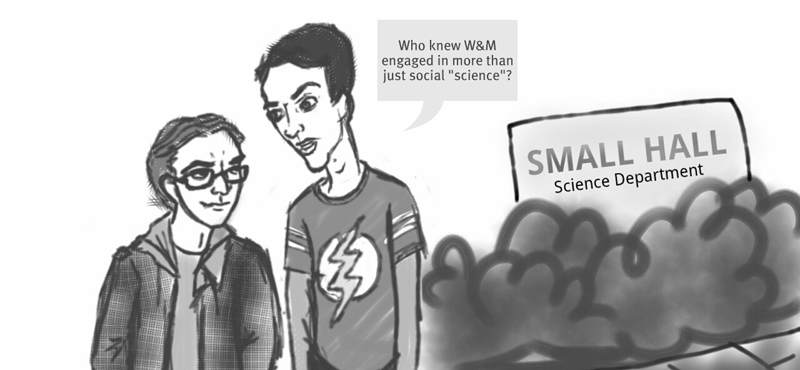At a school as firmly rooted in history as the College of William and Mary, it is no surprise that there is an overwhelming focus on the humanities. The College seems to constantly preach the benefits of a liberal arts curriculum, which forces students to study a variety of fields in order to experience different subjects. While this seemingly endless list of General Education Requirements may seem like torture, the goal is to broaden students’ horizons. Unfortunately, these lofty liberal arts university goals have created the sense that all students at the College are poetry-loving, Freud-reading, political enthusiasts. Some students may fit any one of these categories, but at the College, we are more than that. Part of receiving a liberal arts education is that every student must take classes to fulfill science and math requirements. Because of the stereotype that students at the College are a bunch of humanities-loving hippies, the math and science departments are often overlooked. Recently, however, Gov. Bob McDonnell and the Science Museum of Virginia named professor John Milliman of the College’s Virginia Institute of Marine Science an outstanding scientist, proving that the math and science departments at the College are worthy of praise.
Milliman beat out professors from around the state, including professors from schools known more for their science programs than the College. Among the Virginia state colleges, Virginia Tech, University of Virginia and Virginia Commonwealth University are consistently perceived as more science-oriented schools than the College, but with this award the College has proved it can defy its stereotypes.
The College must continue to cultivate an image outside of the liberal arts. Yes, we take pride in the reputation of our strong humanities departments, but they comprise only one facet of our school and one group of students at the College. In order for the College to continue its reputation as a prestigious institution, we have to make sure each program, from government to physics, is fantastic. We have gifted people working in a variety of programs making breakthroughs and supporting innovative thinking in their fields. Think of the people around you. Our students travel around the world, helping people, building better businesses, making new discoveries, adding to the seemingly endless list of wonderful and exciting achievements of the students at the College.
The College doesn’t have an engineering program or a medical school like some larger state universities, but our students do go on to be experts in those fields, thanks in part to our liberal arts curriculum. Milliman has said that it was through taking a GER that he decided to pursue his interest in geology instead of economics as he had planned. Now he has received a top prize in Virginia’s science community.
We can’t let the stereotype of a liberal arts education keep any of our programs from succeeding. The value of a liberal arts education is in instilling a wealth of knowledge into students, including the sciences. We’d like to thank Milliman for reminding the campus that we aren’t just any liberal arts school.

